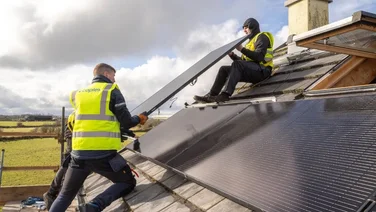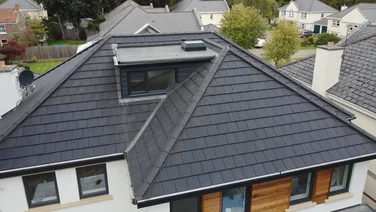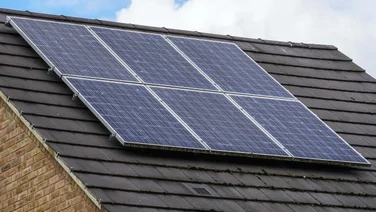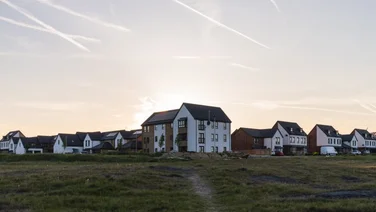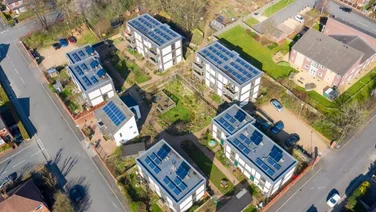✔ Solar panels can cut your bills and dependence on the grid
✔ But they’re expensive and don’t produce energy at night
✔ There are solar panels grants available to help you afford them
The popularity of solar panels is skyrocketing. More than 1.3 million rooftops in the UK are now decked out with panels – and with solar panel costs decreasing massively over the past decade, it’s more accessible than ever.
But why could solar energy benefit you? Well, first and foremost, it can cut your monthly electricity bills by around 70%.
But there’s much more to it than that, so let’s discuss the key pros and cons of switching to solar energy. If you’ve already started picturing panels on your roof, find out how much a solar PV system would cost you by filling out this form – our trusted installers will be in touch before you can say “photovoltaic”.
Where do you want to install solar panels?
Get started
What are the pros and cons of solar panels?
- They can save you money on your energy bills
- You can cash in on the electricity you don’t use
- They'll shrink your carbon footprint
- They’re silent
- They can reduce your dependence on the grid
- They're easy to scale up
- They're low maintenance
- There are grants and schemes available
- There are different solar options
- The installation is expensive
- Their performance is affected by the weather
- Not all roof types are suitable
- They take up a lot of space
- They contain toxic materials
- They're expensive to move
- Their return on investment (ROI) is over a decade
Where do you want to install solar panels?
Get startedThe 9 pros of solar panels
There are several excellent reasons to get solar panels. Here are all the best advantages you can gain by putting these technological marvels on your roof.
1. They can save you money on your energy bills
Powering your house with solar-generated electricity can shave a hefty sum off your monthly energy bills. On average, a 3.5 kilowatt (kW) solar panel system will cost £7,026 – but it’ll save you roughly £454.45 each year, depending on where you’re located in the UK.
Your energy bill savings will depend on two factors:
- How much energy your solar panels produce – To increase your quantity of solar-generated electricity, you can buy high-efficiency solar panels, or add more panels to your roof
- How much of this electricity you actually use – You can buy a solar battery to store the electricity that your panels generate during the day while you’re out, so it’s available for you to use in the evenings (when the sun’s gone down)
2. You can cash in on the electricity you don’t use
For most homes in the UK, solar panels generate so much solar power, homeowners don’t know what to do with it all – which is where the Smart Export Guarantee (SEG) comes in.
The SEG requires licensed electricity suppliers to offer tariffs to small-scale, low-carbon generators, e.g. houses with solar panels. Any solar-generated electricity that doesn’t get used is sent back to the National Grid, and the household is paid for it.
3. They’ll shrink your carbon footprint
The primary reason solar panels are good for the environment is down to their carbon-busting technology. In fact, the average residential solar panel system in the UK saves 0.7 tonnes of carbon dioxide each year.
So, amidst the din of ‘climate emergency’ klaxons, it’s about time you ditched those grubby fossil fuels.
4. They’re silent
These sun-soaking sheets of silicon are great at producing power, but they don’t like to shout about it.
Since there aren’t any moving parts inside a solar panel, they are completely silent – a far cry from the racket of many types of small generators.
5. They can reduce your dependence on the grid
Feeling shackled to the grid? Solar panels can provide the solution. Basically, the more energy you generate, the less you need to purchase from energy companies.
While the average solar PV system won’t give you complete independence (you’re likely to still need to buy electricity from the grid for the evenings), adding a solar battery or two will empower you with genuine self-sufficiency. This way you can store any unused energy for a rainy day (or cloudy day, or night time, in fact).
If you want to avoid using the grid while you’re out and about, you can even get flexible solar panels for your off-grid road trips.
6. They’re easy to scale up
That’s right: solar panels are scalable, which means you can simply add panels to an existing system, instead of having to uproot it and build a bigger one.
The same goes for solar energy storage. Many models of solar batteries are like LEGO bricks, in that they can be stacked into towers and/or arranged side-by-side.
7. They’re low maintenance
Solar panels are fiercely independent, meaning they don’t need checking on 24/7.
To get the most out of your panels, you need to keep them clean and unobstructed. However, since these smooth-surfaced panels are installed at an angle, you’ll find that most dirt and debris will just slide right off. Regular rainfall also helps to keep things squeaky clean.
The vast majority of solar panels come with a 25-year warranty, and will be operational for upwards of 40 years – so they’re with you for the long haul.
8. There are grants and schemes available
These costly companions can put a strain on your purse strings, but there are numerous solar panel grants that can swoop to the rescue:
- The Smart Export Guarantee (SEG) – The SEG enables households that generate low-carbon electricity to receive payments for the surplus energy they export to the grid
- ECO4 – This government scheme can cover up to 100% of the cost of solar panels, but only for energy-inefficient households on certain benefits
- Home Upgrade Grant (now discontinued) – Until March 2025, 45 local authorities were able to offer grants of up to £10,000 to subsidise the cost of solar panels for energy-inefficient homes that aren’t on the gas grid. This has now been replaced with the Warm Homes Local Grant.
9. There are different solar options
Solar energy covers all bases, whether you’re after renewable electricity, or a green way to heat your home.
There are two types of solar energy that you can get for your home: solar thermal and solar panels.
Solar panels absorb the sun’s heat and convert it into electricity, whereas solar thermal systems transform the sun’s energy into heat for household water.
Whilst solar panels’ popularity has exploded in recent years, some have questioned whether solar thermal panels are worth it, given they can only save an average of £1,350 over their lifetime.
The 7 cons of solar panels
Every technology comes with drawbacks that you should learn about before deciding whether to purchasing it, and solar panels are no different. Here are their disadvantages.
1. The installation is expensive
A typical 3-4kWp solar PV system will set you back around £7,026 – not exactly a cheap purchase, although solar panels are becoming increasingly affordable.
The average price of panels has fallen by about 70% over the past decade, and this is set to continue as solar energy becomes increasingly widespread. If you want the full lowdown, check out our detailed guide to solar panel costs.
2. Their performance is affected by the weather
We’re stating the obvious here, but solar panels work much better in the gleaming summer months than in the dark days of winter. When the skies are clear and the sun is beaming down on your rooftop, your solar panels will naturally be at their most productive.
But if there’s one thing Brits can agree on, it’s that our weather is not the most reliable. So during dreary days and winter woes, you’ll rely more on the grid – but that doesn’t mean your solar panels will stop working entirely.
In fact, sunlight is not an essential ingredient in solar power, although it certainly helps. All your solar panels will need to work is daylight.
3. Not all roof types are suitable
Ideally, your roof should be facing southwards at a 30-45 degree angle – although east- and west-facing solar panels can work well too. You’ll need to make sure the roof is free from the shade as well.
If your roof doesn’t fit the criteria, then you might struggle to set up an effective solar PV system.
There’s a lot you can do to optimise your roof conditions, including buying high-efficiency solar panels (if you have limited space), cutting back trees (to reduce shading), and using tilted racks (to angle your panels perfectly).
4. They take up a lot of space
One of the problems with solar panels is that they’re rather sizable pieces of kit, averaging around 2m² per panel – and the more electricity you want to generate, the more panels you’ll need to install. So, the bigger the roof, the better.
If you find yourself running out of room, you can opt for premium, high-efficiency models. Although more expensive, a small number of high-efficiency panels can do the same job as a larger number of standard panels.
5. They contain toxic materials
As with most electronic items, solar panels contain compounds that can be toxic if released into the environment. That’s why it is important to buy from reputable manufacturers and ensure at the end of their life (which could be 40 years or more) they are recycled correctly.
A study published by Nature Energy showed that the global environmental impact of creating solar panels is vastly outweighed by the environmental benefits of using them. Only 4% of the energy generated by a solar panel is offset by the energy required to create it – making solar power one of the world’s cleanest renewable energies.
6. They’re expensive to move
Like a trusty friend, your panels are here to stay. So, if you’re considering installing solar panels onto your home, make sure you’re set on living in that property for a substantial amount of time.
These panels are hefty pieces of equipment, and will be pricey to haul from place to place – not to mention the cost of getting them reinstalled.
7. Their return on investment (ROI) is over a decade
We worked out that, as of 2024, it’ll take homeowners 15.66 years to break even on their solar panels, with average annual savings of 70% on electricity bills.
Although it seems far away, this return on investment is much better than it’s been in previous years – and you’ll never break even on grid electricity.
Next steps
The switch to solar brings benefits that significantly outweigh the cons. Although the initial investment is a lot of money, you can look forward to living in a home decorated with glistening panels, saving money year-on-year, and shrinking your carbon footprint.
Our latest National Home Energy Survey also revealed that 65% of people were likely to buy a house with solar panels.
Sound tempting? To get the ball rolling, you can find out how much it would cost you to install solar panels on your home – simply pop your details in this form, and our professional installers will be in touch.
FAQs
Is there a downside to having solar panels?
Like any new piece of technology, there are downsides to having solar panels on your roof, but the benefits massively outweigh them.
Solar panels can be expensive, their performance is subject to the weather, they don’t work at night, and they don’t break even for more than a decade – but electricity from the grid never breaks even.
Do solar panels work in rain?
Solar panels work perfectly well in rain.
In light cloud, your panels typically produce 24% less electricity, and they generate 67% less than normal in heavy cloud cover – but they still provide plenty of free, green electricity.
Rain even helps to clear your solar panels of dust and debris, making them more effective.
Do solar panels work in winter?
Solar panels absolutely work in winter.
They’ll usually generate less electricity than they do in other seasons, as the sun is up for less of the day, and there’s typically more cloud cover.
But they won’t overheat, so their power output won’t fall for that reason – and if it snows, a blanket of white flakes will reflect even more light onto your panels.
You can find out more about solar panels in winter by visiting our page.
Do solar panels work with moonlight?
No, solar panels don’t work with moonlight.
It would be great if solar panels continued to produce electricity at night, but unfortunately, moonlight is incredibly weak compared to sunlight.
It’s therefore not powerful enough to enable solar panel systems to produce energy.


